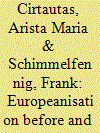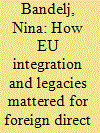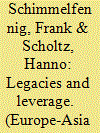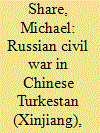|
|
|
Sort Order |
|
|
|
Items / Page
|
|
|
|
|
|
|
| Srl | Item |
| 1 |
ID:
095282


|
|
|
|
|
| Publication |
2010.
|
| Summary/Abstract |
This essay explores positions on European integration in the campaigns of a number of mainstream Polish political parties in recent elections. It shows how contestations of the European Union have, to some extent, been driven by strategic considerations related to inter-party competition. In Poland's fluid party landscape, political actors have sometimes relied on Euroscepticism to create seemingly clear lines of division between themselves and their political competitors. Yet these Eurosceptic views interact with, and are therefore also constrained by, certain legacies: ideas on the relationship between Europe and Poland that are already part of the cultural context.
|
|
|
|
|
|
|
|
|
|
|
|
|
|
|
|
| 2 |
ID:
095278


|
|
|
|
|
| Publication |
2010.
|
| Summary/Abstract |
This introductory essay reviews the literature on historical legacies in the post-communist area and relates it to the study of enlargement and Europeanisation. The authors develop a framework for the special section, specify various ways in which historical legacies can be conceived of affecting conditionality and compliance, give an overview of the contributions and summarise the findings.
|
|
|
|
|
|
|
|
|
|
|
|
|
|
|
|
| 3 |
ID:
095281


|
|
|
|
|
| Publication |
2010.
|
| Summary/Abstract |
This essay uses the case of foreign direct investment (FDI) in Central and Eastern Europe to stipulate how European Union (EU) integration affected the economic globalisation of the post-socialist region. Existing studies argue that expectations of impending EU membership had a direct effect on raising FDI inflows because they reduced perceived investment risks for potential investors. In contrast, I show that the EU accession process worked through an indirect effect on FDI: it influenced post-socialist states' efforts to promote FDI as a desirable strategy of economic development and the behaviour of firms. These state efforts, in turn, increased FDI inflows, net of conventional risk and return factors. Further analyses indicate that decisions about state FDI-promotion have been influenced not only by EU conditionality but also, and importantly, by particular legacies, namely the countries' initial choice of privatisation strategies, extent of reform during socialism and history of state sovereignty. Overall, the results suggest that EU integration and legacies of the past shape both the structural and the ideational context for domestic decision-making elites in Central and Eastern Europe, and may act not only as constraints but also as enabling conditions facilitating the global economic integration of the region.
|
|
|
|
|
|
|
|
|
|
|
|
|
|
|
|
| 4 |
ID:
095279


|
|
|
|
|
| Publication |
2010.
|
| Summary/Abstract |
Previous studies have established strong and robust effects of EU political conditionality on democracy in the neighbouring countries. We test these effects against the claim that historical legacies condition the likelihood of successful democratisation-and possibly the EU's political conditionality as well. Based on a panel study of 36 countries of the Eastern and Mediterranean neighbourhood of the EU between 1988 and 2004, we show that cultural legacies of religious civilisation are indeed conducive to or inhibit democratisation, and reduce the effects of political conditionality, but they do not explain away the EU's role in promoting democratic consolidation.
|
|
|
|
|
|
|
|
|
|
|
|
|
|
|
|
| 5 |
ID:
095280


|
|
|
|
|
| Publication |
2010.
|
| Summary/Abstract |
Using cross-national governance indicators and evidence from a recent Bulgarian survey, this essay examines political reforms in Bulgaria and Romania since EU accession and, in particular, the 'backsliding' hypothesis-that these countries have abandoned or reversed the reforms they introduced in order to qualify for membership of the European Union. It finds no systematic evidence either that these countries have been backsliding or that their trajectories differ significantly from their first-wave Central and East European neighbours, though governance reforms have slowed after accession. The second part of the essay focuses on the mechanisms responsible for the lack of significant backsliding, emphasising the role of continued conditionality through the safeguard clauses, EU funding and increasing linkage between new and old EU members, including opportunities for East Europeans to work and travel in Western Europe.
|
|
|
|
|
|
|
|
|
|
|
|
|
|
|
|
| 6 |
ID:
095277


|
|
|
|
|
| Publication |
2010.
|
| Summary/Abstract |
A very important yet little known front in the Russian Civil War existed in neighbouring Xinjiang, a region in China's northwest, that was at that time self-governing. In Xinjiang, Russian White Commanders and their troops gained sanctuary, financial assistance, food and shelter from Chinese provincial leaders, and then used those sanctuaries to launch operations against Soviet forces. However, by 1921, Red Army troops destroyed any remaining organised White forces, which then melted into the Chinese landscape. The ramifications of the Russian Civil War in Xinjiang had important impacts on the people of Xinjiang, and on Russia and China as well.
|
|
|
|
|
|
|
|
|
|
|
|
|
|
|
|
|
|
|
|
|